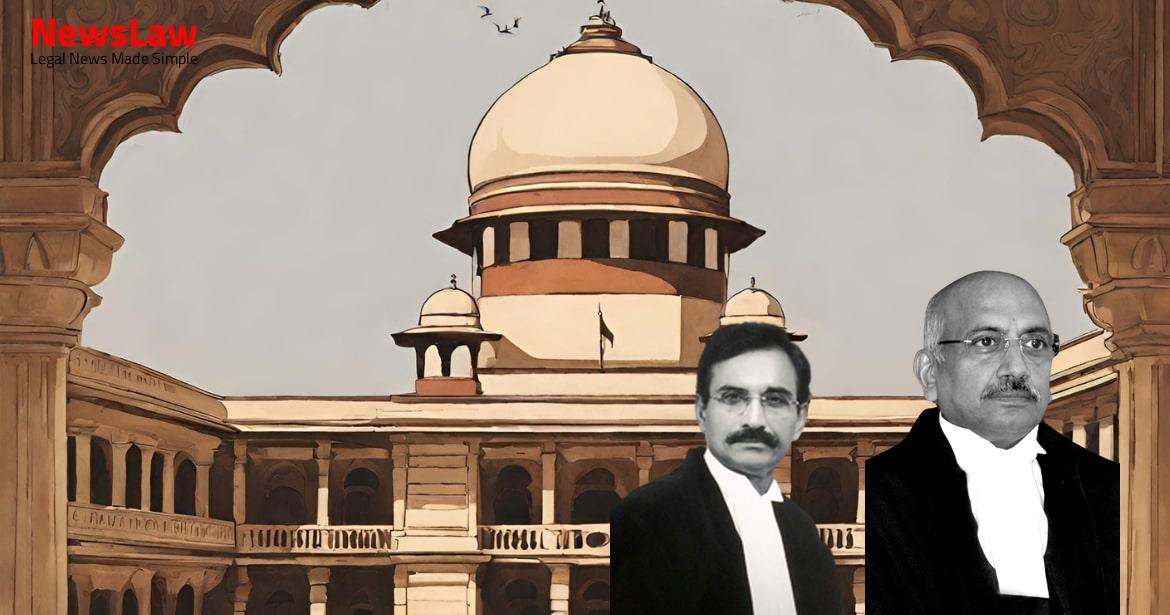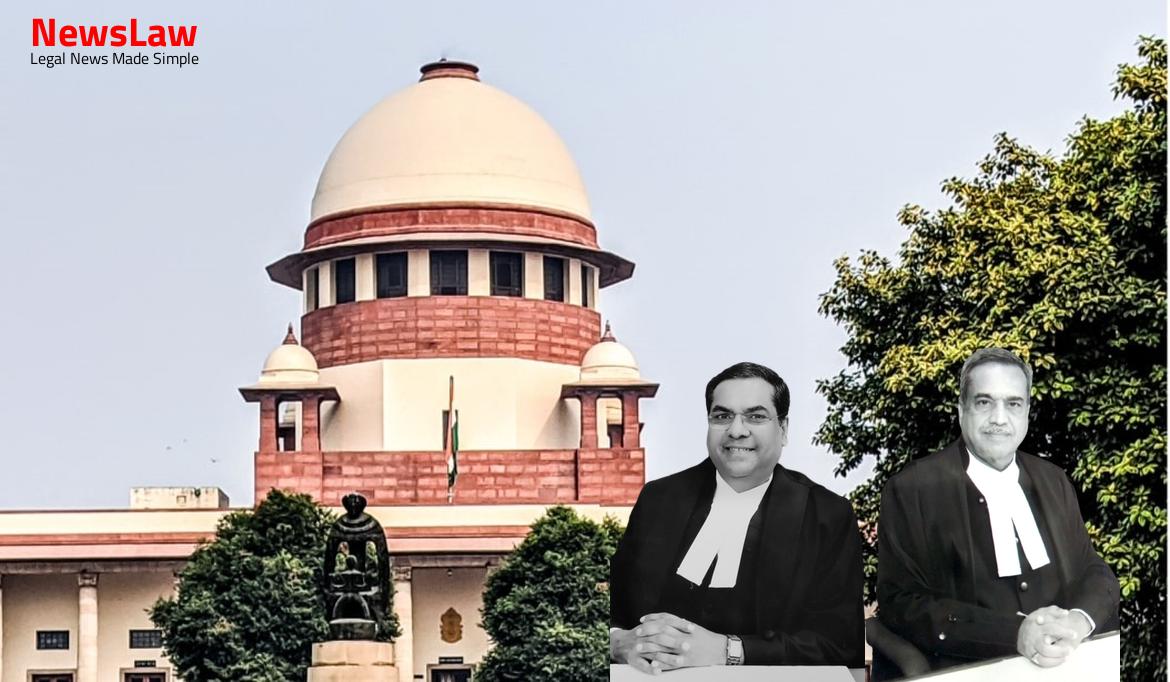In a recent significant legal ruling by the Supreme Court of India, full compensation has been granted in the case of Sunita v. IFFCO-TOKIO General Insurance Co. Ltd. The judgment brings closure to the claimants seeking justice following the unfortunate highway accident. This decision marks a crucial step towards ensuring accountability for all parties involved in the incident.
Facts
- On 18th August, 2013, a car collided with a 14-wheeler trailer truck left abandoned on the highway.
- The car passengers, Sunita, Ashtavinayak Patil, Deepali, and driver Saiprasad Karande died in the accident.
- Appellant-claimants filed appeals due to deduction of compensation for contributory negligence.
- Allegations were made against the control of the offending truck for not taking precautionary measures.
- Surviving passenger Smt. Sushma sustained grievous injuries.
- Car was insured by IFFCO-TOKIO General Insurance Co. Ltd., while the truck was insured by another insurer.
- Claims were filed against the truck owner and insurer, not the car owner or its insurer.
- Car owner and insurer were exonerated as claimants had not sought compensation from them.
- The High Court affirmed the Tribunal’s observation on contributory negligence.
- The High Court modified and enhanced the compensation awarded by the Tribunal.
- The Tribunal held the owner of the truck and the insurance company jointly responsible for indemnifying the claims of the claimants.
- The compensation awarded by the Tribunal was reduced by 50% due to contributory negligence.
- The High Court applied the rule of last opportunity and held the driver of the car partly responsible for the accident.
- The High Court directed the insurance company to indemnify the claims to the extent of 50%.
- The Division Bench of the High Court observed that the driver of the car could have avoided the accident if he had been cautious.
- The appeals were disposed of, and the modified compensation amounts were specified by the High Court.
- The insurance company was directed to satisfy the award within four weeks.
- The apportionment and disbursement of the compensation amount were to be done as per the Tribunal’s award.
- Any amount in deposit was to be transmitted to the Tribunal for disbursement to the claimants.
Also Read: Landmark Judgement Upholding Workers’ Rights and Benefits
Analysis
- The Tribunal’s analysis was well-considered and a plausible view, not permitting the High Court to overturn its findings casually.
- The contributory negligence of a driver cannot be attached to passengers to reduce compensation.
- The High Court’s deduction of compensation for legal heirs and injured parties was deemed invalid.
- The site plan supported evidence that the offending truck was parked in the middle of the road.
- In dark conditions on a highway, it would be imprudent to expect drivers to spot a stationary vehicle and avoid accidents.
- The High Court’s presumption on the driver’s negligence was based on conjectures and surmises.
- The Courts below incorrectly applied the principle of contributory negligence to passengers which is illegal and impermissible.
- The High Court’s reversal of the Tribunal’s findings was unwarranted and sets aside.
- The appellants are entitled to full compensation without deduction for contributory negligence.
- The offending truck parked in the middle of the road without indicators or lights violated traffic laws and posed a risk to other road users.
- Legal provisions mandate not leaving vehicles unattended in the middle of the road without precautionary measures.
- Article 136 grants wide powers that can be exercised sparingly in cases of manifest illegality or grave miscarriage of justice.
- Concurrent findings are binding unless tainted with perversity.
- Contributory negligence is confined to the actual negligence of the plaintiff or agents, not passengers.
- Interference with concurrent findings is done sparingly under Article 136, only when the judgment is absolutely perverse.
- The principle of identification or imputation does not attach the driver’s negligence to passengers of a vehicle.
- Courts do not interfere with concurrent findings unless they are based on no evidence or misinterpretation of evidence.
- Contributory negligence requires an act or omission contributing materially to the accident.
- Failure to avoid collision by taking extraordinary precautions does not constitute negligence.
- The negligence of a driver does not apply to passengers, and contributory negligence cannot be attributed to innocent passengers.
- The High Court’s reasoning on contributory negligence was contradictory and paradoxical.
- Section 127(2) of the Act allows for the immediate removal of abandoned or hazardous vehicles by a towing service if it poses a traffic hazard.
- Regulation 15 of the Rules of Road Regulation, 1989 requires drivers to park their vehicles in a manner that does not obstruct or inconvenience other road users.
- Drivers are prohibited from parking at road crossings or main roads as per Regulation 15.
- Section 126 of the Act states that vehicles cannot remain stationary in public places.
- The person in control of the offending truck insured by Insurer was fully responsible for the negligence leading to the accident.
- No deduction shall be made from the compensation payable to the appellant-claimants.
- They shall be entitled to the full compensation as assessed by the Tribunal and modified by the High Court.
- The finding recorded by the Courts below on the issue of responsibility is reversed as being perverse and unsustainable.
- The appellant-Malutai has challenged the apportionment of compensation between them and the co-claimant.
- The deduction of 50% of compensation awarded to the appellant-claimants on account of contributory negligence cannot be sustained.
Also Read: Landmark Judgement on Pensionary Benefits in SSD Fund Case
Decision
- The apportionment of the compensation inter se between the claimants as directed by the Tribunal shall not be disturbed.
- The respondent No.2-Insurer along with the owner of the offending truck is jointly and severally liable to indemnify the awards.
- The claimants, being the mother and wife of the deceased – Ashtavinayak Patil, are entitled to full compensation without any deduction on account of contributory negligence.
- The prayer of the appellant-Malutai for modification in the apportionment is declined.
- The apportionment of the compensation between the appellant-Malutai and the co-claimant (Smt. Sushma) as directed by the Tribunal and affirmed by the High Court shall not be interfered with.
Also Read: Supreme Court Quashes Reduction in Pay Scale Decision and Recovery Order in Bihar Govt. vs. XYZ
Case Title: SUSHMA Vs. NITIN GANAPATI RANGOLE (2024 INSC 706)
Case Number: C.A. No.-010648-010648 – 2024



